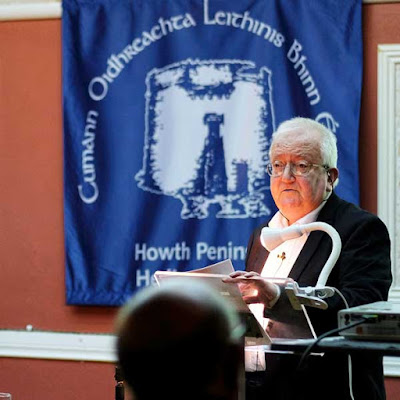Background
The Howth Peninsula Heritage Society, a respectable and long-established group in Howth, had invited a certain P. Ó Duibhir, an itinerant
Had they been consulted in advance, the Gárdaí would have cautioned against inviting such an individual into a private club.
The Event
Ó Duibhir arrived promptly enough and was of reasonably respectable appearance (see Photo "The Orator").
Having tried to ingratiate himself with some of the women in the audience, he then set up his stall (see Photo "Intro Shot 2")
and embarked upon a comprehensive and, it must be said, interesting exposition on the life and works of Gordon Brewster (see Photo "Into His Stride").
Up to this point, the audience was generally quiet and attentive, although there was a certain amount of ominous shuffling of feet and muttering from the cheap seats in the back row.
It was when Ó Duibhir started to comment in detail on various Brewster cartoons that the trouble began. Many of these cartoons were, in the opinion of this Member, scurrilous and of low quality, in that they insulted many eminent personages and commented in a vulgar manner on the political and social events of the time.
At this point the audience, especially those in the cheap back row seats, was getting restive. Feet were stamped, there were catcalls, and heckling began (see Photo "The First Heckler").
The organisers, commendably, tried to shut off the Orator's microphone but were fought off by Ó Duibhir, who continued to shout down the growing volume of heckling (see Photo "The Second Heckler").
Matters came to a crisis point when Ó Duibhir exhibited a cartoon depicting Ernest Blythe in the act of removing a shilling from the Old Age Pension.
This enraged the audience and mayhem ensued. Chairs and bottles were thrown and a scuffle involving fisticuffs broke out in the back-row cheap seats. Several ladies fainted.
The Gárdaí, Fire Brigade and ambulances were called and arrived promptly.
To his credit and in mitigation of any charges that may be brought when he is apprehended, Ó Duibhir made a final, desperate, effort to quell the disturbance (see Photo " A Last Effort To Restore Order"), before fleeing the scene through an open window.
Sequel and Lines of Enquiry
Seven people were taken to hospital and eleven others were treated at the scene. Most of their injuries are not life-threatening. The premises was burnt to the ground.
Ó Duibhir is still at large. The public are warned not to approach him. He may be being assisted and hidden by one Finbarr Crowley, a local ne'er-do-well who is also being sought.
An individual in a blue patterned hoodie who was seen running from the premises is also being sought, although it is believed that this person may already have left the jurisdiction.
(signed) O'Brien.








